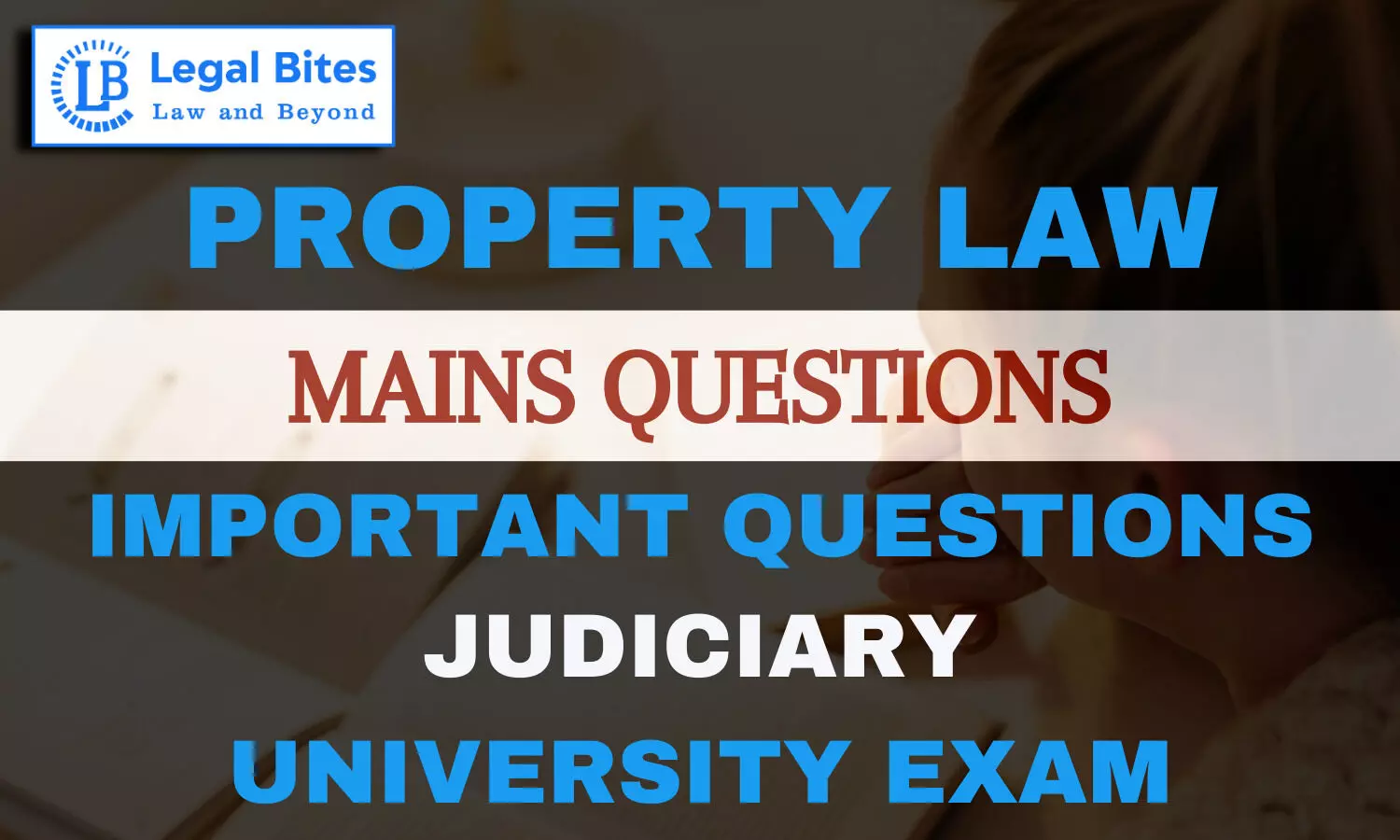Discuss with suitable illustrations, the rule: 'once a mortgage, always a mortgage'. Also comment on 'clogs on the the equity of redemption'.
Find the answer to the mains question of Property Law only on Legal Bites.;

Question: Discuss with suitable illustrations, the rule: 'once a mortgage, always a mortgage'. Also comment on 'clogs on the the equity of redemption'. [BJS 1975] Find the answer to the mains question of Property Law only on Legal Bites. [Discuss with suitable illustrations, the rule: 'once a mortgage, always a mortgage'. Also comment on 'clogs on the the equity of redemption'.]AnswerThe right of redemption is an inherent entitlement of the mortgagor, allowing them to reclaim the...
Question: Discuss with suitable illustrations, the rule: 'once a mortgage, always a mortgage'. Also comment on 'clogs on the the equity of redemption'. [BJS 1975]
Find the answer to the mains question of Property Law only on Legal Bites. [Discuss with suitable illustrations, the rule: 'once a mortgage, always a mortgage'. Also comment on 'clogs on the the equity of redemption'.]
Answer
The right of redemption is an inherent entitlement of the mortgagor, allowing them to reclaim the mortgaged property upon discharging the debt or surplus after a power of sale. Section 60 of the Transfer of Property Act, 1882 defines the right of redemption.
This equitable right remains valid, ensuring that the mortgagor can redeem the property, and it is enshrined in Section 60 of the Act. It highlights the mortgagor's right to redeem the property by paying the mortgage money at the proper time and place. Further, Section 60 of the Act outlines the procedure, including the delivery of documents and possession of the property to the mortgagor upon repayment.
Once a Mortgage, Always a Mortgage
The legal maxim "once a mortgage, always a mortgage" underscores the perpetual nature of the mortgage relationship. This principle ensures that a mortgage remains such even after the debt is fully repaid. The principle is the outcome of combined notions viz. Equity, Justice, and Good Conscience.
The basis of the maxim was explicated by Lindley M.R. in the case of Stanley v. Wilde [(1899) 2 Ch 474] as:
‘Any provision inserted to prevent redemption on payment or performance of the debt or obligation for which the security was given is what is meant by a clog or fetter on the equity of redemption and is therefore void. It follows from this, that ‘once a mortgage always a mortgage.’
Let us take an example, where a lender advances Rs. 1 Lakh to a borrower, securing it against the borrower's land valued at Rs. 2 Lakh. In the mortgage deed, the lender inserts an "option to transfer" clause, allowing them to take possession of the property in case of default. This condition, attempting to extinguish the mortgagor's equity of redemption, is invalid under the principle of "once a mortgage, always a mortgage."
The case of Knocks v. Roulds, 1902 SC 24, emphasizes this, stating that the right of redemption is inseparable from the mortgage, and attempts to alter this inherent right are null and void.
Clog on Redemption
The doctrine of clog on redemption safeguards the mortgagor's right from undue restrictions. Any condition or stipulation hindering the mortgagor's ability to redeem the property is considered void. Notably, any attempt to transform the mortgage into a sale or impose penalties beyond reasonable estimates of damages is impermissible.
In the case of Vadilal Chhaganlal v. Gokaldas Mansukh, AIR 1953 Bom 408, it was a case of a mortgage of 99 years, where the mortgagee was allowed to construct any structure on the property at any expense. The court observed that repayment of the principal money along with interest and the cost of construction make the mortgage practically impossible as it is something beyond the ability of the mortgagor. Thus, it is quite clear that the mortgagee had taken advantage of a helpless mortgagor to sign that agreement, hence, the conditions were held clogged on redemption.
Exceptions to Clog on Redemption
While the general rule is against any restriction on the right of redemption, certain exceptions allow limitations under specific circumstances. These include the mortgagor's submission, court decree, vesting of mortgaged property in the state, or acquisition by the government.
Foreclosure: Foreclosure, governed by Section 67 of the Transfer of Property Act, grants the mortgagee the right to obtain a decree debarring the mortgagor from redeeming the property. This remedy is available when the debt becomes due, and the mortgagor fails to redeem the property.
Election: The doctrine of election requires a choice between two inconsistent rights. If a transferor, without the right to transfer, confers a benefit on the real owner, the latter must elect to either accept the transfer and benefit or reject both. This doctrine prevents one from approbating and reprobating simultaneously.
Conditions for Election: The election applies when the transferor disposes of property without the right, confers a benefit, and both occur in the same transaction. The owner is then given the choice to either accept the benefit and allow the transfer or reject both.
Effect of Election: If the owner dissents from the transfer, they must relinquish the benefit, and it reverts to the transferor.



